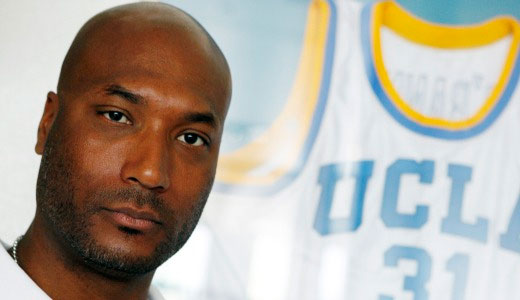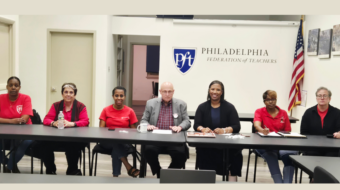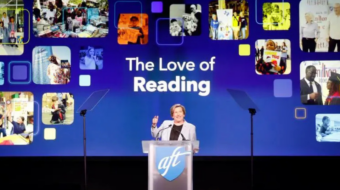
In an important new article, historian Taylor Branch argues that the very structure of college sports is based on student-athletes that generate billions of dollars for universities and private companies but in return they’re left earning nothing for themselves. In other words student-athletes are essentially working full-time jobs for free.
In what some are calling the most important article ever written about college sports, Pulitzer Prize-winning historian and author Taylor Branch offers a powerful indictment about the hypocrisy built into college sports. Writing in the latest issue of The Atlantic, Branch, best known for his volumes on civil rights history, details a lengthy piece titled The Shame of College Sports.
“For all the outrage, the real scandal is not that students are getting illegally paid or recruited, it’s that two of the noble principles on which the NCAA justifies its existence – ‘amateurism’ and the ‘student-athlete’ – are cynical hoaxes, legalistic confections propagated by the universities so they can exploit the skills and fame of young athletes,” writes Branch. “The tragedy at the heart of sports is not that some college athletes are getting paid, but that more of them are not.”
Providing ample evidence Branch notes “student-athletes” are themselves lacking in their rights as American citizens. They are, he writes, the “heir[s] to Dred Scott*.”
Branch emphasizes, “Big-time college sports are fully commercialized. Billions of dollars flow through them each year. The NCAA makes money, and enables universities and corporations to make money, from the unpaid labor of young athletes.”
He continues, “College athletes are not slaves. Yet to survey the scene – corporations and universities enriching themselves on the backs of uncompensated young men, whose status as ‘student-athletes’ deprives them of the right to due process guaranteed by the Constitution – is to catch an unmistakable whiff of the plantation. Perhaps a more apt metaphor is colonialism: college sports, as overseen by the NCAA, is a system imposed by well-meaning paternalists and rationalized with hoary sentiments about caring for the well being of the colonized. But it is nonetheless, unjust. The NCAA, in its zealous defense of bogus principles, sometimes destroys the dreams of innocent athletes.”
Branch goes on to say the NCAA itself “is a classic cartel.” Efforts to reform it over the last two decades have been largely fruitless.
“The time has come for a major overhaul,” says Branch. “And whether the powers that be like it or not, big changes are coming. Threats loom in multiple fronts: in Congress, the courts, breakaway athletic conferences, student rebellion, and public disgust.”
The term “student-athlete,” Branch explains, was essentially created for no educational reasons – but only as a smokescreen to keep players from being able to sue for workers’ compensation if they are injured playing for dear old alma mater. At the end of the day, the whole point of the NCAA – despite its sanctimonious educational claptrap – is to protect the unjust concept of amateurism, so that its client athletic departments get free labor.
Mark Emmert, current president of the NCAA, recently said student-athletes are not our employees. They don’t work for us. They are our students. So we don’t pay them.
Branch outlines how it was crucial, for legal reasons, not to let athletes enjoy the status of other university employees; hence they must be “students,” without the common rights of laborers and the right to collective bargaining.
Speaking on NPR Branch said, “Why should we presume to be involved in a decision about what a fair rate is for their [student] services? If they’re generating hundreds of millions of dollars, then they should be free to bargain for their services. And it distorts the whole question of whether or not professionalized sports are compatible with higher education. That is a real debate that we ought to be having, that universities ought to be having.”
Perhaps most disturbing is what happens to athletes who get injured or “fail to perform to expectations.” The college cynically yanks their scholarships. Branch notes the story of Joseph Agnew, who lost his full ride after junior year at Rice University, leaving him the choice of dropping out or paying $35,000 in tuition.
“The hoax is that it’s the only place in American society where we impose amateur status on someone without their consent,” said Branch on NPR. “They’re not amateurs because they’ve chosen to be. They’re amateurs because we said that’s what you have to be.”
He adds, “And in that sense, it is a plantation, and the structure is fully professionalized by all the adults who make millions, and it’s fair for everyone, except the people at the bottom who produce most of the actual value.”
Dale Brown, who coached the Louisiana State University basketball team for 25 years, said he agrees with Branch’s assessment.
“It almost seems impossible that in the freest country in the world, we have tolerated an organization like the NCAA,” he wrote in The Atlantic. “Is it because we were indifferent, intimidated, uninformed, or just didn’t know how to change a system that has failed in its mission? When I was coaching I desperately wanted to change the system that legalized against human dignity and practiced monumental hypocrisy.”
The NCAA was created in 1906, at the behest of President Theodore Roosevelt, to protect and look out for the best interests of student athletes. Critics however argue the NCAA today, is only looking out for their profits.
Photo: Former UCLA basketball player Ed O’Bannon Jr. in his office in Henderson, Nev., Sept. 2010. O’Bannon is part of a lawsuit seeking revenue sharing for NCAA athletes. “There are millions and millions of dollars being made off the sweat and grind of the student athlete,” O’Bannon said. “Student athletes see none of that other than their education.” photo, (Isaac Brekken/AP)
*Editor’s note: Refers to the slave Dred Scott who tried to buy his freedom, was turned down, and then sought freedom through the courts for years. In 1857, the U.S. Supreme Court ruled that African-American slaves and their descendants could never become citizens and therefore could never sue the government. According to then Chief Justice Taney, “Blacks had no rights which the white man was bound to respect.”










